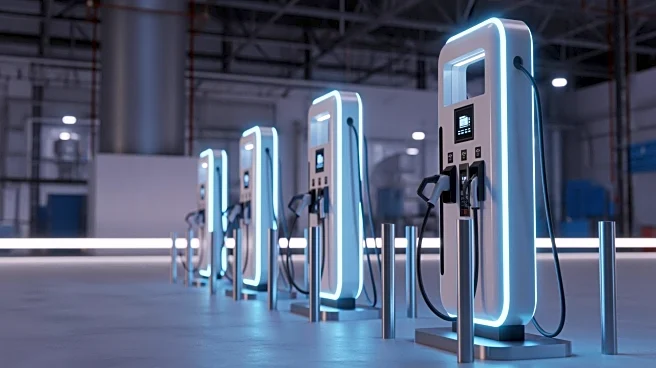What's Happening?
Toyota Motor North America has inaugurated its first U.S. battery plant in Liberty, North Carolina, marking a significant expansion in its manufacturing capabilities. The facility, valued at $13.9 billion,
is Toyota's eleventh production site in the United States and its first battery plant outside Japan. The plant is expected to produce 30 GWh annually and create up to 5,100 jobs. Toyota has also announced an additional $10 billion investment over the next five years to support future mobility efforts, bringing its total U.S. investment to nearly $60 billion. The plant will serve as a hub for developing and producing lithium-ion batteries for hybrid and electric vehicles.
Why It's Important?
This development is crucial for the U.S. automotive industry as it strengthens domestic production capabilities for electrified vehicles. Toyota's investment is expected to boost the local economy by creating thousands of jobs and supporting educational initiatives through grants. The move aligns with broader industry trends towards electrification and sustainable energy solutions. It also reflects confidence in the U.S. market amid regulatory changes impacting electric vehicles. The investment supports the U.S. government's push to onshore production of batteries, which is vital for reducing dependency on foreign supply chains.
What's Next?
Toyota plans to expand its production lines at the North Carolina facility by 2030, further increasing its capacity to produce batteries for a growing portfolio of electrified vehicles. The company is committed to supporting workforce development and educational initiatives in the region, which will help prepare the future workforce for careers in STEM fields. As the plant ramps up production, it will likely influence other automakers to invest in similar facilities, potentially leading to increased competition and innovation in the battery manufacturing sector.
Beyond the Headlines
Toyota's investment in North Carolina is not just about manufacturing; it represents a commitment to community development and sustainability. The facility will include amenities for employees, such as childcare and healthcare services, fostering a supportive work environment. The company's Driving Possibilities initiative aims to close opportunity gaps in education, empowering students in underserved communities. This holistic approach to investment highlights the ethical and social dimensions of corporate responsibility in the modern economy.









